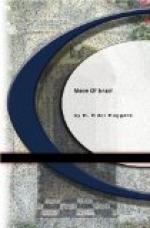“O God,” she said, “O God of my fathers, help my poor heart, help my poor heart!”
We were about to withdraw, or rather to ask her what she ailed, when suddenly she turned her head, so that the light fell full upon her face. So lovely was it that I caught my breath and the Prince at my side started. Indeed it was more than lovely, for as a lamp shines through an alabaster vase or a shell of pearl so did the spirit within this woman shine through her tear-stained face, making it mysterious as the night. Then I understood, perhaps for the first time, that it is the spirit which gives true beauty both to maid and man and not the flesh. The white vase of alabaster, however shapely, is still a vase alone; it is the hidden lamp within that graces it with the glory of a star. And those eyes, those large, dreaming eyes aswim with tears and hued like richest lapis-lazuli, oh! what man could look on them and not be stirred?
“Merapi!” I whispered.
“Moon of Israel!” murmured Seti, “filled with the moon, lovely as the moon, mystic as the moon and worshipping the moon, her mother.”
“She is in trouble; let us help her,” I said.
“Nay, wait a while, Ana, for never again shall you and I see such a sight as this.”
Low as we spoke beneath our breath, I think the lady heard us. At least her face changed and grew frightened. Hastily she rose, lifted the great bundle of straw upon which she had been kneeling and placed it on her head. She ran a few steps, then stumbled and sank down with a little moan of pain. In an instant we were at her side. She stared at us affrighted, for who we were she could not see because of the wide hoods of our common cloaks that made us look like midnight thieves, or slave-dealing Bedouin.
“Oh! Sirs,” she babbled, “harm me not. I have nothing of value on me save this amulet.”
“Who are you and what do you here?” asked the Prince disguising his voice.
“Sirs, I am Merapi, the daughter of Nathan the Levite, he whom the accursed Egyptian captain, Khuaka, murdered at Tanis.”
“How do you dare to call the Egyptians accursed?” asked Seti in tones made gruff to hide his laughter.
“Oh! Sirs, because they are—I mean because I thought you were Arabs who hate them, as we do. At least this Egyptian was accursed, for the high Prince Seti, Pharaoh’s heir, caused him to be beheaded for that crime.”
“And do you hate the high Prince Seti, Pharaoh’s heir, and call him accursed?”
She hesitated, then in a doubtful voice said:
“No, I do not hate him.”
“Why not, seeing that you hate the Egyptians of whom he is one of the first and therefore twice worthy of hatred, being the son of your oppressor, Pharaoh?”
“Because, although I have tried my best, I cannot. Also,” she added with the joy of one who has found a good reason, “he avenged my father.”
“This is no cause, girl, seeing that he only did what the law forced him to do. They say that this dog of a Pharaoh’s son is here in Goshen upon some mission. Is it true, and have you seen him? Answer, for we of the desert folk desire to know.”




